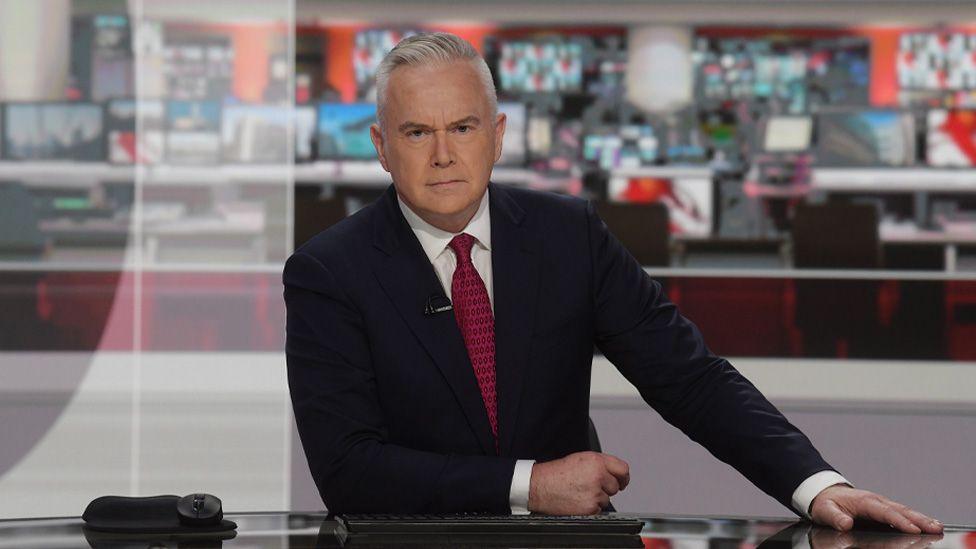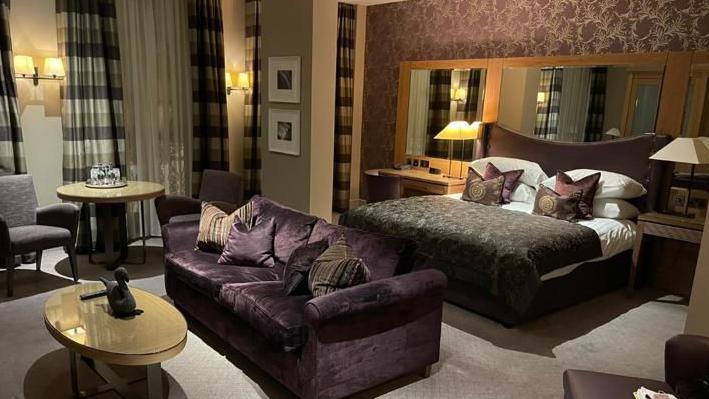Whistleblowers criticise BBC over Huw Edwards inquiry

- Published
Whistleblowers who gave evidence to the BBC internal inquiry into Huw Edwards have criticised the way it was handled.
A staff member who told BBC News last year about flirtatious private messages sent by the presenter said they were "disappointed" not to have heard more about the inquiry's progress.
A second person, who claimed Edwards sent suggestive messages alongside a picture of his hotel suite in Windsor at the time of Prince Philip's funeral, said it felt like "things have been swept under the carpet".
Edwards was suspended in July 2023 after reports in the Sun newspaper claiming he had paid a young person for sexually explicit images.
The BBC started an internal inquiry which is thought not to have continued after Edwards left his job in April. The findings have not been published.
Director General Tim Davie said on Thursday that the BBC was not "sitting on anything that we need to share with police or is of a serious nature."
The staff member claiming to have been sent flirtatious messages by Edwards said they considered them an abuse of power and were made to feel uncomfortable.
They said they did not feel reassured that BBC management have taken steps to deal with internal complaints or issues with power dynamics in the newsroom.
The whistleblowing team asked "all the questions they hoped they would" and were taking it seriously, they said.
"Then I was sort of surprised that I haven’t been informed about the findings or how the report was used," they said.
"I certainly don't feel like I've heard anything of substance about how the investigation went. In a way that's disappointing because it was quite a stressful thing to go through. It was all a big ordeal."
The staff member came forward after emails were sent out encouraging people to do so, saying "it felt like we had an obligation to report it".
Hotel room picture

Hotel suite photo whistleblower says they were sent by Edwards
Meanwhile, the second whistleblower, who has since left the BBC, said Edwards was "pushy" in trying to arrange to meet them.
They said Edwards became "persuasive" on WhatsApp, and "would say things to make me feel guilty".
The former BBC staff member said: "Once he said on WhatsApp, you clearly think I’m trying to trap you, when I refused to go to his flat.”
“There were points when I would ignore the messages… then he would send me a screenshot of him reading the News at Ten to catch my attention," they added.
When trying to set up meetings, Edwards would say "you know how famous I am, I can’t meet out in public", the whistleblower said.
Referring to the messages at the time of Prince Philip's funeral, which they first revealed to the Sun, external but have also shared with the BBC, they said he asked if they were staying overnight.
In the morning, the whistleblower claimed Edwards sent a photograph of the room he had stayed in – a suite paid for by the BBC.
"(The message) went, oh there’s plenty of room here.”
“…he replied in the morning and said, you missed a good night.”
On the investigation, they said they "gave everything and co-operated", and want the findings to be published.
They said all they knew about the investigation had been heard "through the newspapers" and the ordeal had "really upset them".
"The BBC ultimately have a duty of care… they need to be able to show that anyone who goes and works there in the future will be listened to and cared about because there’s been a history of people at the BBC who have behaved inappropriately.”
They said: “It doesn’t seem transparent, it seems like things have been swept under the carpet, they’ve marked their own homework.”
Guilty pleas
Their comments came after Edwards pleaded guilty on Wednesday to three counts of making indecent images of children, in a separate case.
He accessed indecent images of children as young as seven on WhatsApp between December 2020 and August 2021, which police said were sent to him by a convicted paedophile.
The BBC knew at the time of his arrest in November 2023 that he was being accused of offences relating to child abuse images.
The news presenter would have been dismissed had he been charged while still an employee, the corporation said in a statement on Wednesday.
The first staff member said they felt there was "less risk" of Edwards working for other media organisations following his court hearing, which was one of their main concerns.
But the employee said they did not feel the "power dynamics with these big stars, working in close proximity with junior staff" had been reflected on very much.
"I certainly haven't seen that in any of the kinds of messages that we've had from bosses or anything that they've thought about how somebody was kind of allowed to feel like he could get away with anything," they said.
"Probably not just by BBC bosses, but by the media world. He was treated like this God of news."
They said they were "not convinced" others would not be able to feel that powerful working for BBC News in the future.
On what they want from the BBC now, the staff member said: "I would just like some kind of indication that they've taken it seriously. And I don't see any indication of that.
"Even if it was not publishing a report, but just putting out something that says we've been reflecting on how these power dynamics are dealt with and the power of the most senior employees."
"I’d just like to hear from the managers about what they think, have they reflected, is anything going to change?" the staff member added.
A third BBC employee, who also gave evidence to the inquiry about Edwards' behaviour, said they had not heard anything back from the BBC since November and said they felt "totally isolated."
On Thursday, the BBC defended the decision not to sack Mr Edwards, despite knowing that he had been arrested in November over the most serious category of indecent images of children.
Mr Davie told the BBC the corporation had taken “difficult decisions in a fair and judicious manner.”
Asked whether the BBC was going to publish its own investigation into Edwards, he replied that they had always followed up on anything that had come to them but there was a limit to what they could share about an individual employee.
He said to do so “blows apart whistleblowing and a confidential process”.
But Mr Davie added: “ We are not sitting on anything that I think we need to share with police or is of serious nature which would make me feel we haven’t followed up everything properly.”
He was asked if he could categorically say that the BBC had no further evidence of malpractice by Edwards.
Mr Davie said that any evidence of “truly horrendous” offences was not in the hands of BBC.
He added that they had created a culture where they were making it clear that they took every allegation seriously and where they were encouraging people to speak up.